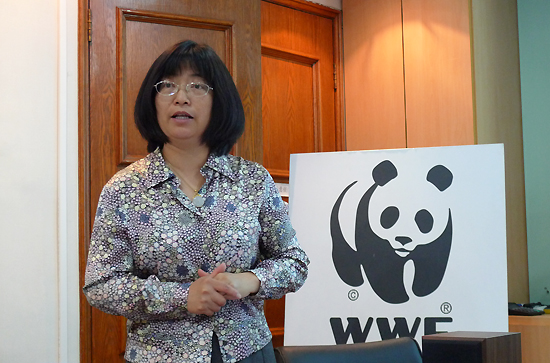WWF: 2 planets not enough for mankind by 2030
- By Xu Lin
 0 Comment(s)
0 Comment(s) Print
Print E-mail China.org.cn, May 16, 2012
E-mail China.org.cn, May 16, 2012
An ever-growing demand for resources by a growing population is putting tremendous pressures on our planet's biodiversity and threatening mankind's future security, health and well-being – so much so that continued overusing of resources could deplete two Earth-like planets by 2030, says World Wide Fund for Nature.
WWF's latest "Living Planet Report," a biennial survey on the environmental impact of human activities, was launched Tuesday from the International Space Station by Dutch astronaut André Kuipers during his European Space Agency mission.
"We only have one Earth. From up here I can see humanity's footprint, including forest fires, air pollution and erosion – challenges which are reflected in this edition of the Living Planet Report," Kuipers said. While there are pressures of unsustainable development on the planet, "we have the ability to save our home, not only for our benefit, but, above all, for generations to come," he added.
The report uses the global Living Planet Index to measure changes in the health of the planet's ecosystems by tracking 9,014 populations of 2,688 mammal, bird, reptile, amphibian and fish species from different biomes and regions.
The index shows a 28 percent global decline in biodiversity health since 1970. The tropics are the hardest hit, where there has been a 60 percent decline in less than 40 years. The Earth's Ecological Footprint, one of the key indicators used in the report, illustrates how our demand on natural resources has become unsustainable.
|
|
|
Li Lin, the deputy country representative leader, China for a Global Shift Initiative, WWF's Beijing office [Photo by Xu Lin/China.org.cn] |
Li Lin, the deputy country representative leader of WWF's Beijing office, said the Earth was like a huge spaceship with human beings as passengers. People on the planet are using 50 percent more resources than what the Earth can sustainably produce, and if the situation does not change, even two planets will not be enough by 2030 and three planets will be needed in 2050.
Li said population and per capita consumption are the two principal factors for the Ecological Footprint, so the impact of population growth and overconsumption are critical driving forces behind the environmental pressures facing the Earth.
The report highlights the impact of urbanization as a growing concern. By 2050, the global urban population will reach 6 billion – almost doubling the current number – and two out of every three people will live in cities. This will lead to higher per capita Ecological Footprint, especially carbon footprint. For example, per capita ecological footprint of residences in Beijing is three times China's national average.
The report also underscores differences between rich and poor countries in terms of their environmental impact. High-income countries have an average Ecological Footprint that is five times that of low-income countries. The per capita Ecological Footprint of Brazil, Russia, India, Indonesia, China, South Africa and medium-income countries is generally smaller than that of the high-income countries. However, these countries are expanding rapidly and face bigger challenges on sustainable development.
The report outlines a number of solutions needed to reverse the declining trend shown in the Living Planet Index and bring the Ecological Footprint down to within the Earth's planetary limits. It sets out 16 priority actions, including improved consumption patterns, putting an economic value on natural capital, and creating legal and policy frameworks that manage equitable access to food, water and energy.
Li said that although it is every government's responsibility to improve on environmental protection and establish sustainable development with consideration to the Earth's limited resources, an international organization is necessary to administrate the global environment, and the United Nations Environment Program (UNEP) should be the one.
The report was released five weeks ahead of the U.N. Conference on Sustainable Development (Rio+20). Twenty years on from the last Earth summit, this meeting will be a key opportunity for global leaders to reaffirm their commitment to creating a sustainable future for all of mankind.
The Living Planet Report is jointly produced by WWF, Zoological Society of London and Global Footprint Network.







Go to Forum >>0 Comment(s)